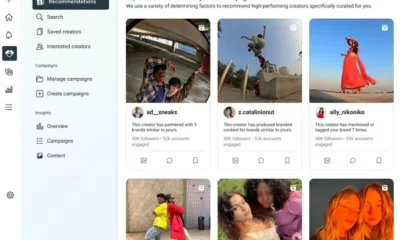SOCIAL
Who Really Benefits from the Creator Economy?

The Creator Economy has become a much bigger focus over the last few years, with the rise of TikTok sparking a new battle amongst the social platforms to maximize their creator appeal, in order to keep popular users posting to their apps.
Which makes sense. Vine, which many view as the precursor to TikTok, eventually died out because parent company Twitter couldn’t establish an effective revenue share model for short clips, a key challenge of the format. If TikTok can’t get creators paid, they won’t stick around, which both YouTube and Instagram see as an opportunity to mitigate TikTok’s growth.
Combine that with the increasing work from home push, which has seen more people reassessing how they make money, and indeed, whether they could possibly get paid for the content that they post online, and you can see how the platforms view this as a key opportunity to win over more creators, and keep them posting to their apps – while ideally, fending off rising competition.
It all connects up, and for social platforms battling for audience attention, it’s a perfect scenario for them to also lure the most entertaining users to post more often, in order to prop-up their engagement stats.
But there’s one core, essential truth of the creator economy that undercuts the emphasis and enthusiasm in the space: Most people are simply not good enough at being entertaining, on a consistent basis, to make any real money out of being an online creator.
The stats tell the tale – according to a recent survey conducted by influencer marketing platform Aspire, which incorporates feedback from over 1,700 creators, only 4.3% of them are earning six figures or more per year from their online posts.
Which, really, makes sense. Sure, there are the Mr. Beasts of the world – who recently turned down a billion dollar offer for his YouTube channel. But off the top of your head, how many top online creators can you actually name?
PewDiePie, Dream, the DÁmelio sisters. You likely have your own, more niche favorites as well, but I’m guessing that list starts to thin out pretty quick.
One consideration here is that there’s a limit to how much content we can take in. That means that while some of the top stars are seeing millions of views, and occupying hours and hours of people’s time, that also then further reduces the amount of time left for other creators – which means that, realistically, there’s not enough capacity to support an infinite number of creators in an infinite number of niches.
But the real truth is that being a successful creator is hard.
Not only do you have to be entertaining – which very, very few people are good at every single time they post – but you also need to keep churning out new content every other day. The pressure on creators, in this sense, is very real, and it can lead to significant mental and even physical health impacts for those working to keep up with demand, and keep themselves top of mind for their respective audiences.
But you have to keep posting. Stop uploading your content and people will lose interest, and all that work that you’ve put into building your presence will evaporate very fast.
You have to keep coming up with ideas, and you’ve no doubt seen for yourself how that pressure leads to some of your once favorite creators eventually losing their touch, as they scrape the bottom of the barrel again and again, desperately seeking new inspiration for their content.
The truth is that most people suck at making content, the vast majority of us can’t create great, resonant entertainment every time, over and over again. Some of the more established creators, with bigger audiences, can get away with this, but for most, a run of bad or boring content will see a big chunk of their audience unfollow, losing them all of that attention.
There’s a reason why you see the same movie stars in the top movies over and over again, there’s a reason why you see the same hosts on every other live event on TV. Because being an entertainer is not easy – it takes skill, it takes natural ability combined with a honed focus on what works, and an innate sense of your audience and what they want to see.
Most people just don’t have that, and won’t ever get it, no matter how hard they try.
Creating a trending clip is one thing, but repeating that success is near impossible, and for most, being a one-hit wonder online is the best they’ll ever achieve.
For all the hopes of social platforms that they can get people posting more and more stuff to their apps, helping to boost their all-important engagement levels, so that they can sell more ads, for all the tales that they may want to sell about how creators can make real money online, via their platforms, the truth is, they probably can’t, in general terms.
Most people are not going to see success as online content creators, but the platforms know that the next generation, who’ve grown up with these web-originated stars as their aspirational heroes, are also increasingly hoping that they’ll be the one to make it, and break through the popularity barrier. And they’re cashing in on this, in order to juice their performance stats.
That’s not to say that people should give up. If you’re passionate about a topic, and you create good content, then you should pursue that passion, within reason, and see if you can succeed. ‘Reason’ in this context is relative to your personal situation – but absolutely, exploring what makes you happy, and connecting with like-minded people, can indeed produce results, and career satisfaction.
There’s also the expanded concept of monetization in Web3, and how potential new paradigms for online connection will facilitate more ways for users to take a share of any money generated from their online activity, as opposed to big businesses gleaning the vast majority of benefit from such.
There are potential opportunities within this, but the concept of the Creator Economy being a pathway to monetary success is simply not realistic for the vast majority of people.
As such, it’s less a creator ‘economy’ as it is a ‘creator fantasy’, and it’s the big players that are benefiting from promoting that, and projecting the idea that you too can become a billionaire just by posting online.
You can’t, and it’s safe to say that nobody reading this is ever going to make even $100k from posting videos online.
The fundamental flaw within the Creator Economy push is that it’s not an equal playing field, it’s not a democratically distributed opportunity, and in the majority, nobody’s really making any money. Except the big tech platforms, which are benefitting from the flood of hopefuls posting to their apps.
And eventually, what’s going to happen is that the field will thin, the brand deals will go to fewer and fewer people, and the focus will switch from broad-reaching approaches in influencer marketing, to curated, managed talent pools of the top stars.
Like it always has, via talent agencies, casting directors, publishers, etc. While the internet opens up new opportunities, time and time again, such potential has also, eventually, highlighted why the system had become the way it was before we sought to reform it.
Because it’s more efficient, it’s more effective, and while you want every single person to be able to go and start posting about that thing they really love, and get paid for doing so, it’s highly unlikely they’ll make it on their own.
But talent agencies could recognize their potential and mentor them, or guide them through to the next stage. Other advisors could see a means to connect these users with brand opportunities.
Which is where the real money will be, in the formation of intermediaries that can spot and manage talent to help maximize their potential, while also acting as a conduit to brand deals.
Maybe, that could be you. But a heap has to go right, even in that scenario.
Essentially, the Creator Economy, as it’s currently being presented, is a farce, and slowly, creators, brands and platforms are starting to realize this. YouTube, Meta, TikTok – all the platforms, of course, want to keep adding tools that will get you paid, as a means to keep you posting. But for the most part, these small payments are just carrots designed to lure you along, as you keep delivering more engagement.
SOCIAL
Snapchat Explores New Messaging Retention Feature: A Game-Changer or Risky Move?

In a recent announcement, Snapchat revealed a groundbreaking update that challenges its traditional design ethos. The platform is experimenting with an option that allows users to defy the 24-hour auto-delete rule, a feature synonymous with Snapchat’s ephemeral messaging model.
The proposed change aims to introduce a “Never delete” option in messaging retention settings, aligning Snapchat more closely with conventional messaging apps. While this move may blur Snapchat’s distinctive selling point, Snap appears convinced of its necessity.
According to Snap, the decision stems from user feedback and a commitment to innovation based on user needs. The company aims to provide greater flexibility and control over conversations, catering to the preferences of its community.
Currently undergoing trials in select markets, the new feature empowers users to adjust retention settings on a conversation-by-conversation basis. Flexibility remains paramount, with participants able to modify settings within chats and receive in-chat notifications to ensure transparency.
Snapchat underscores that the default auto-delete feature will persist, reinforcing its design philosophy centered on ephemerality. However, with the app gaining traction as a primary messaging platform, the option offers users a means to preserve longer chat histories.
The update marks a pivotal moment for Snapchat, renowned for its disappearing message premise, especially popular among younger demographics. Retaining this focus has been pivotal to Snapchat’s identity, but the shift suggests a broader strategy aimed at diversifying its user base.
This strategy may appeal particularly to older demographics, potentially extending Snapchat’s relevance as users age. By emulating features of conventional messaging platforms, Snapchat seeks to enhance its appeal and broaden its reach.
Yet, the introduction of message retention poses questions about Snapchat’s uniqueness. While addressing user demands, the risk of diluting Snapchat’s distinctiveness looms large.
As Snapchat ventures into uncharted territory, the outcome of this experiment remains uncertain. Will message retention propel Snapchat to new heights, or will it compromise the platform’s uniqueness?
Only time will tell.
SOCIAL
Catering to specific audience boosts your business, says accountant turned coach

While it is tempting to try to appeal to a broad audience, the founder of alcohol-free coaching service Just the Tonic, Sandra Parker, believes the best thing you can do for your business is focus on your niche. Here’s how she did just that.
When running a business, reaching out to as many clients as possible can be tempting. But it also risks making your marketing “too generic,” warns Sandra Parker, the founder of Just The Tonic Coaching.
“From the very start of my business, I knew exactly who I could help and who I couldn’t,” Parker told My Biggest Lessons.
Parker struggled with alcohol dependence as a young professional. Today, her business targets high-achieving individuals who face challenges similar to those she had early in her career.
“I understand their frustrations, I understand their fears, and I understand their coping mechanisms and the stories they’re telling themselves,” Parker said. “Because of that, I’m able to market very effectively, to speak in a language that they understand, and am able to reach them.”Â
“I believe that it’s really important that you know exactly who your customer or your client is, and you target them, and you resist the temptation to make your marketing too generic to try and reach everyone,” she explained.
“If you speak specifically to your target clients, you will reach them, and I believe that’s the way that you’re going to be more successful.
Watch the video for more of Sandra Parker’s biggest lessons.
SOCIAL
Instagram Tests Live-Stream Games to Enhance Engagement

Instagram’s testing out some new options to help spice up your live-streams in the app, with some live broadcasters now able to select a game that they can play with viewers in-stream.
As you can see in these example screens, posted by Ahmed Ghanem, some creators now have the option to play either “This or That”, a question and answer prompt that you can share with your viewers, or “Trivia”, to generate more engagement within your IG live-streams.
That could be a simple way to spark more conversation and interaction, which could then lead into further engagement opportunities from your live audience.
Meta’s been exploring more ways to make live-streaming a bigger consideration for IG creators, with a view to live-streams potentially catching on with more users.
That includes the gradual expansion of its “Stars” live-stream donation program, giving more creators in more regions a means to accept donations from live-stream viewers, while back in December, Instagram also added some new options to make it easier to go live using third-party tools via desktop PCs.
Live streaming has been a major shift in China, where shopping live-streams, in particular, have led to massive opportunities for streaming platforms. They haven’t caught on in the same way in Western regions, but as TikTok and YouTube look to push live-stream adoption, there is still a chance that they will become a much bigger element in future.
Which is why IG is also trying to stay in touch, and add more ways for its creators to engage via streams. Live-stream games is another element within this, which could make this a better community-building, and potentially sales-driving option.
We’ve asked Instagram for more information on this test, and we’ll update this post if/when we hear back.
-

 MARKETING7 days ago
MARKETING7 days agoRoundel Media Studio: What to Expect From Target’s New Self-Service Platform
-

 SEO6 days ago
SEO6 days agoGoogle Limits News Links In California Over Proposed ‘Link Tax’ Law
-
SEARCHENGINES7 days ago
Daily Search Forum Recap: April 12, 2024
-

 SEARCHENGINES5 days ago
SEARCHENGINES5 days agoGoogle Core Update Volatility, Helpful Content Update Gone, Dangerous Google Search Results & Google Ads Confusion
-

 SEO5 days ago
SEO5 days ago10 Paid Search & PPC Planning Best Practices
-

 MARKETING6 days ago
MARKETING6 days ago2 Ways to Take Back the Power in Your Business: Part 2
-

 MARKETING4 days ago
MARKETING4 days ago5 Psychological Tactics to Write Better Emails
-

 PPC6 days ago
PPC6 days agoCritical Display Error in Brand Safety Metrics On Twitter/X Corrected















You must be logged in to post a comment Login